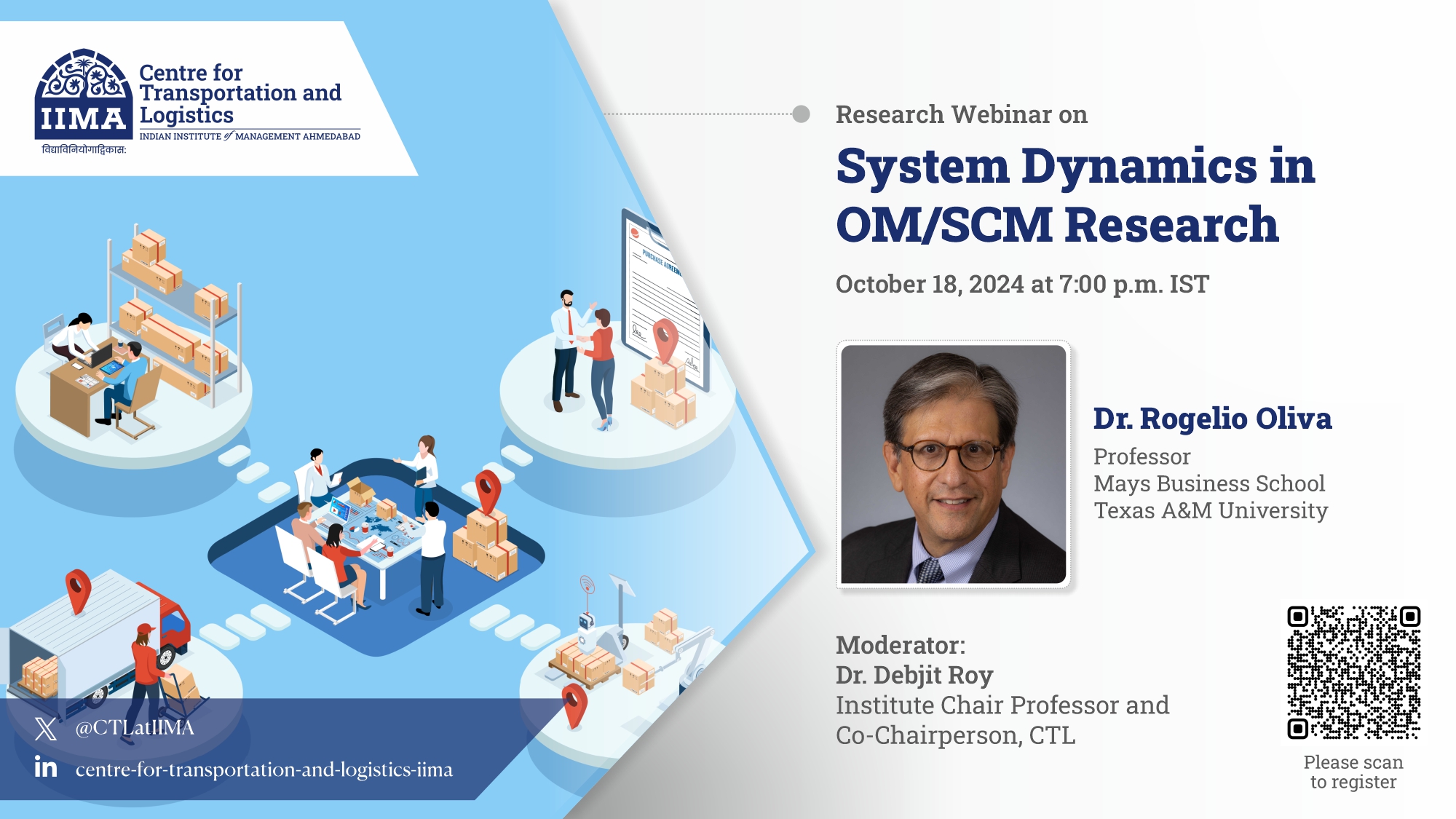

System Dynamics in OM/SCM Research

Abstract: Operations Management research has long recognized that even core organizational processes, such as production and scheduling, encompass interactions between multiple organizational functions and other organizations and actors, including customers, suppliers, workers, competitors and financial markets (Sterman, Oliva, Linderman, & Bendoly, 2015). In the late 1950s, Jay W. Forrester had the insight to use feedback concepts from control theory to map and explain industrial problems. Specifically, he adopted the perspective that managers are information converters that transform the information flows they receive into streams of decisions that control organizational activity (Simon, 1997). Although the decision making process is nonlinear, noisy and hindered by the perceptual and cognitive limitations of the decision makers, Forrester argues that it is possible to detect the structural elements of the decision-making process and to capture the guiding policies behind those decisions (Cyert & March, 1963; Forrester, 1961). In his first modeling effort, Forrester (1958, 1961) showed how the interaction of the physical characteristics of a production and distribution system with the behavioural elements characterizing the decisions of agents within the system explained the persistent oscillations of production and sales in a manufacturing supply chain. Since Forrester’s seminal work on supply chains, it has been the hallmark of system dynamics to incorporate both the physical aspects of systems and the behavioural characteristics of the actors’ decision-making. The synergies and overlaps between operations and supply chain management (OM/SCM) and system dynamics have been traced to the origins (Lane, 1997) and stated goals (Größler, Thun, & Milling, 2008) of both fields. Sterman et al. (2015) outlined four ethodological elements of system dynamics that are relevant to the OM/SCM community. Namely, system dynamics adopts structural and behavioural representations of systems; it focuses on disequilibrium models (equilibrium in a dynamic context is the exception rather than the rule); it adopts a broad model boundary to incorporate narrow and broad feedback mechanisms; and it develops models through grounded methods in an effort to capture the interactions of elements as they exist in the real world. Applying these methodological elements often results in models that are not analytically tractable but are easy to simulate. The models, however, are a formal integration of the operational and behavioural aspects of a system. The simulation environment enables rigorous tests of the ability of the model to explain problematic behaviour and allows for sensitivity analysis, policy design and optimization. It is this integration of operational and behavioural elements into a formal representation of the system that makes system dynamics a natural tool for the exploration of behavioural operations problems. The system dynamics method provides a unifying framework to represent prior knowledge, data, and hypotheses emerging from the two paradigms. In this talk, Prof. Oliva will give a personal account of how those principles and capabilities have informed and sustained a productive research strategy and show preliminary results of current work assessing the impact of managers on a retailer’s operational performance.
About the Speaker: Dr. Rogelio Oliva is the Robyn L. '89 and Alan B. Roberts '78 Chair in Business in the Department of Information and Operations Management at Mays Business School, and Research Affiliate at MIT Sloan System Dynamics Group. His research explores how behavioural and social aspects of an organization interact with its technical components to determine the firm's operational performance. His current research interests include behavioural operations management, retail and service operations, and the transition that product manufacturers are making to become service providers. His research work has been published in several academic journals, among them: Management Science, Organization Science, Journal of Operations Management, Manufacturing & Service Operations Management, Production and Operations Management, and California Management Review. He is the recipient of the 2019 Jay W. Forrester Award for the best written contribution to the System Dynamics field in the preceding five years. Dr. Oliva teaches courses in operations management, supply chain management, and management information systems for the MBA and Executive MBA programs. He has received multiple teaching awards including the Production and Operations Management Society's Skinner Teaching Achievement Award (2014) and the Association of Former Students of Texas A&M University Distinguished Achievement Award at the College (2009) and University (2013) levels. A native of Cd. Valles, Mexico, he holds a B.E. in Industrial and Systems Engineering from the Monterrey Institute of Technology (Mexico), an M.A. in Systems in Management from Lancaster University (UK), and a Ph.D. in Operations Management and System Dynamics from the Massachusetts Institute of Technology. Prior to joining the Mays faculty, Professor Oliva served in the faculty of the Harvard Business School, Universidad Adolfo Ibañez in Chile, and Monterrey Tec in Mexico. He has worked for small manufacturing businesses in Mexico and consults on improvement of service and manufacturing operations, organizational change initiatives, and the development of system dynamics models. He currently serves as Editor-in-Chief of the Journal of Operations Management.
